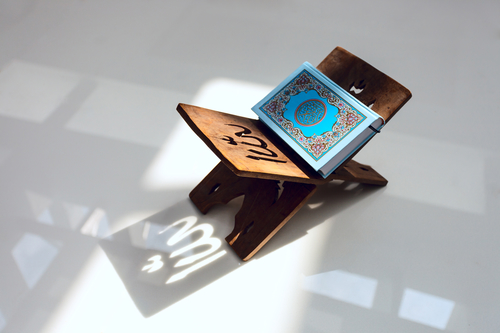
The study of maqamat is the study of at-taghanni bi’l Quran, or the study of beautifying the voice in recitation of the Quran. Beautifying the voice in recitation is something that our beloved Messenger sallallahu alaihi wa sallam commanded us to do, when he said “Beautify the Quran with your voices”, and when he said “He is not from us, who does not ‘yataghanna‘ (chant melodiously) the Quran”.
The maqamat describe the various patterns of melody (or tunes) that reciters use in their recitation. This adds to (and shouldn’t take away from) the beauty of proper articulation and proper rhythm that one learns from studying the science of tajweed.
Let’s step back for a moment and think about the different sounds that can come from the human vocal cords, one of the most amazing gifts of Allah subhanahu wa ta’ala that we often forget to be grateful for. You may have noticed that the sound of someone’s voice changes from situation to situation – a person might sound upbeat and cheerful when they’re happy, or they might sound gloomy and melancholy when sad or depressed. A person would sound a certain way in a moment of extreme pain or distress, and would sound a different way in a moment of excitement. Many aspects of the sound, such as the pace, degree of modulation, and so on, vary immensely between these different-sounding voices. On top of being able to articulate speech and convey meaning through words, Allah ‘azza wa jall has blessed us with the ability to convey mood and emotion through our voices … subhanallah!
Like these varied situations, the ayat of the Quran vary widely. There are ayat of rahmah (mercy), ayat describing Jannah and what it has in store for those who believe, ayat describing the fire of Hell and the punishment for those who turn away from Allah, ayat describing the majesty and grandeur of the Lord of the Worlds, ayat of qital (fighting), and so on. Not only do they vary in terms of the topics they discuss, but they also generate different feelings in the listener.
The theory of maqamat teaches us how to produce beautiful sounds without discord, so that they are pleasing to the ear, and can evoke certain moods and emotions that aid in delivering the message of the Quran directly to the hearts of both the reciter and the listener. The different maqamat have characteristic sounds – this is why for example among the murattal reciters, Sh. Abdurrahman as-Sudais sounds different from Sh. Sa’d al-Ghamidy, who sounds different from Sh. Ahmad al-Ajmy – they recite with different tunes. Amongst the mujawwad reciters, for example Sh. al-Minshawi or Sh. Abdul Basit, you’ll notice that they vary their tune during the course of their recitation – what they’re doing essentially is varying their tune to bring out the different emotions of the ayat they’re reciting.
Before we part ways, here is a video compiling some of the maqamat/tunes used by Sh. al-Minshawi … enjoy!


